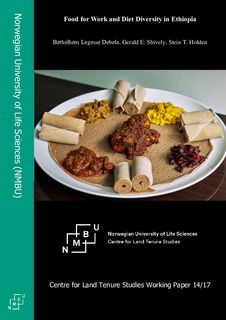| dc.contributor.author | Debela, Bethelhem Legesse | |
| dc.contributor.author | Shively, Gerald | |
| dc.contributor.author | Holden, Stein Terje | |
| dc.coverage.spatial | Ethiopia | nb_NO |
| dc.date.accessioned | 2018-02-05T12:11:36Z | |
| dc.date.available | 2018-02-05T12:11:36Z | |
| dc.date.issued | 2017 | |
| dc.identifier.uri | http://hdl.handle.net/11250/2482621 | |
| dc.description.abstract | We use four waves of panel data from Northern Ethiopia to investigate the link between Food for Work (FFW) participation and the diversity of food consumption and production. Food-based transfer programs have become a standard tool for addressing the problem of chronic food insecurity in developing countries. Such programs have the potential to expand diet diversity if food items provided under FFW are not part of the beneficiaries’ staple diet. By raising effective incomes, cash payments also have the potential to “crowd in” purchases of nutritionally important foods. On the other hand, FFW programs have the potential to undermine dietary diversity by altering the basic crop mix if participation requires households to divert labor away from on-farm production. The net effect is unclear, which we empirically investigate in this study. By employing random effects, fixed effects and difference-in-difference estimations, we find that FFW participants had greater dietary diversity compared to non-participants, with an average effect magnitude equivalent to one-fifth of a standard deviation in the food variety score. When items directly provided by the FFW program are excluded from the variety score, the overall effect is statistically weaker, but similar in sign and magnitude, suggesting modest “crowding in” of diet diversity from FFW participation. Findings also reveal that higher intensity of participation in FFW is linked with diversified food consumption. We find no evidence that FFW participation led to changes in production diversity, suggesting that FFW programs may not be competing for labor with on farm production. Findings have relevance for interventions that aim to improve food security and promote dietary quality in low-income populations. | nb_NO |
| dc.description.sponsorship | Norges Forskningsråd ; Utenriksdepartementet ; NORAD ; Deutsche Forschungsgemeinschaft | nb_NO |
| dc.language.iso | eng | nb_NO |
| dc.publisher | Norwegian University of Life Sciences, Ås | nb_NO |
| dc.relation.ispartofseries | CLTS Working paper;2017:14 | |
| dc.rights | Attribution-NonCommercial-NoDerivatives 4.0 Internasjonal | * |
| dc.rights.uri | http://creativecommons.org/licenses/by-nc-nd/4.0/deed.no | * |
| dc.subject | Nutrition | nb_NO |
| dc.title | Food for work and diet diversity in Ethiopia | nb_NO |
| dc.type | Working paper | nb_NO |
| dc.subject.keyword | Diet | |
| dc.subject.keyword | Food security | |
| dc.subject.keyword | Nutrition | |

